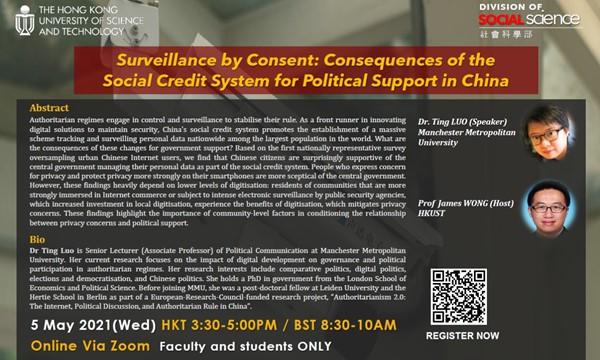Speaker
Dr Ting Luo, Senior Lecturer (Associate Professor) of Political Communication at Manchester Metropolitan University
Abstract
Authoritarian regimes engage in control and surveillance to stabilise their rule. As a front runner in innovating digital solutions to maintain security, China’s social credit system promotes the establishment of a massive scheme tracking and surveilling personal data nationwide among the largest population in the world. What are the consequences of these changes for government support? Based on the first nationally representative survey oversampling urban Chinese Internet users, we find that Chinese citizens are surprisingly supportive of the central government managing their personal data as part of the social credit system. People who express concern for privacy and protect privacy more strongly on their smartphones are more sceptical of the central government. However, these findings heavily depend on lower levels of digitisation: residents of communities that are more strongly immersed in Internet commerce or subject to intense electronic surveillance by public security agencies, which increased investment in local digitisation, experience the benefits of digitisation, which mitigates privacy concerns. These findings highlight the importance of community-level factors in conditioning the relationship between privacy concerns and political support.
Bio
Dr Ting Luo is Senior Lecturer (Associate Professor) of Political Communication at Manchester Metropolitan University. Her current research focuses on the impact of digital development on governance and political participation in authoritarian regimes. Her research interests include comparative politics, digital politics, elections and democratisation, and Chinese politics. She holds a PhD in government from the London School of Economics and Political Science. Before joining MMU, she was a post-doctoral fellow at Leiden University and the Hertie School in Berlin as part of a European-Research-Council-funded research project, “Authoritarianism 2.0: The Internet, Political Discussion, and Authoritarian Rule in China”.

